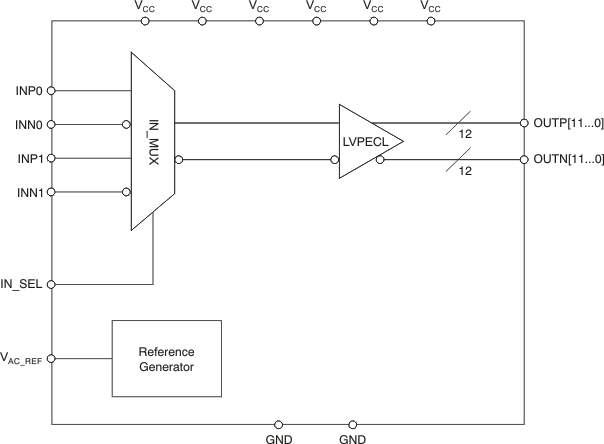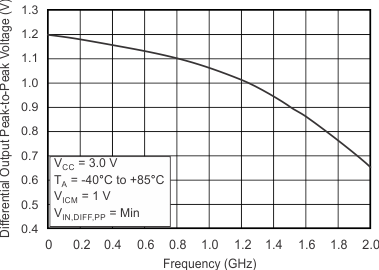SCAS886E August 2009 – December 2015 CDCLVP1212
PRODUCTION DATA.
- 1 Features
- 2 Applications
- 3 Description
- 4 Revision History
- 5 Device Comparison Table
- 6 Pin Configuration and Functions
-
7 Specifications
- 7.1 Absolute Maximum Ratings
- 7.2 ESD Ratings
- 7.3 Recommended Operating Conditions
- 7.4 Thermal Information
- 7.5 Electrical Characteristics: LVCMOS Input
- 7.6 Electrical Characteristics: Differential Input
- 7.7 Electrical Characteristics: LVPECL Output, At VCC = 2.375 V to 2.625 V
- 7.8 Electrical Characteristics: LVPECL Output, at VCC = 3.0 V to 3.6 V
- 7.9 Pin Characteristics
- 7.10 Timing Requirements
- 7.11 Typical Characteristics
- 8 Parameter Measurement Information
- 9 Detailed Description
- 10Application and Implementation
- 11Power Supply Recommendations
- 12Layout
- 13Device and Documentation Support
- 14Mechanical, Packaging, and Orderable Information
Package Options
Mechanical Data (Package|Pins)
- RHA|40
Thermal pad, mechanical data (Package|Pins)
- RHA|40
Orderable Information
1 Features
- 2:12 Differential Buffer
- Selectable Clock Inputs Through Control Terminal
- Universal Inputs Accept LVPECL, LVDS, and LVCMOS/LVTTL
- 12 LVPECL Outputs
- Maximum Clock Frequency: 2 GHz
- Maximum Core Current Consumption: 88 mA
- Very Low Additive Jitter: <100 fs, rms in 10-kHz to 20-MHz Offset Range:
- 57 fs, rms (typ) @ 122.88 MHz
- 48 fs, rms (typ) @ 156.25 MHz
- 30 fs, rms (typ) @ 312.5 MHz
- 2.375-V to 3.6-V Device Power Supply
- Maximum Propagation Delay: 550 ps
- Maximum Output Skew: 25 ps
- LVPECL Reference Voltage, VAC_REF, Available for Capacitive-Coupled Inputs
- Industrial Temperature Range: –40°C to 85°C
- ESD Protection Exceeds 2 kV (HBM)
- Supports 105°C PCB Temperature (Measured with a Thermal Pad)
- Available in 6-mm × 6-mm QFN-40 (RHA) Package
2 Applications
- Wireless Communications
- Telecommunications/Networking
- Medical Imaging
- Test and Measurement Equipment
3 Description
The CDCLVP1212 is a highly versatile, low additive jitter buffer that can generate 12 copies of LVPECL clock outputs from one of two selectable LVPECL, LVDS, or LVCMOS inputs for a variety of communication applications. It has a maximum clock frequency up to 2 GHz. The CDCLVP1212 features an on-chip multiplexer (MUX) for selecting one of two inputs that can be easily configured solely through a control terminal. The overall additive jitter performance is less than 0.1 ps, RMS from 10 kHz to 20 MHz, and overall output skew is as low as 25 ps, making the device a perfect choice for use in demanding applications.
The CDCLVP1212 clock buffer distributes one of two selectable clock inputs (IN0, IN1) to 12 pairs of differential LVPECL clock outputs (OUT0, OUT11) with minimum skew for clock distribution. The CDCLVP1212 can accept two clock sources into an input multiplexer. The inputs can be LVPECL, LVDS, or LVCMOS/LVTTL.
The CDCLVP1212 is specifically designed for driving 50-Ω transmission lines. When driving the inputs in single-ended mode, the LVPECL bias voltage (VAC_REF) should be applied to the unused negative input terminal. However, for high-speed performance up to 2 GHz, differential mode is strongly recommended.
The CDCLVP1212 is packaged in a small 40-terminal, 6-mm x 6-mm QFN package and is characterized for operation from –40°C to 85°C.
Device Information(1)
| PART NUMBER | PACKAGE | BODY SIZE (NOM) |
|---|---|---|
| CDCLVP1212 | QFN (40) | 6.00 mm x 6.00 mm |
- For all available packages, see the orderable addendum at the end of the datasheet.
3.0.0.1 Functional Block Diagram

Peak-to-Peak Voltage vs. Frequency
